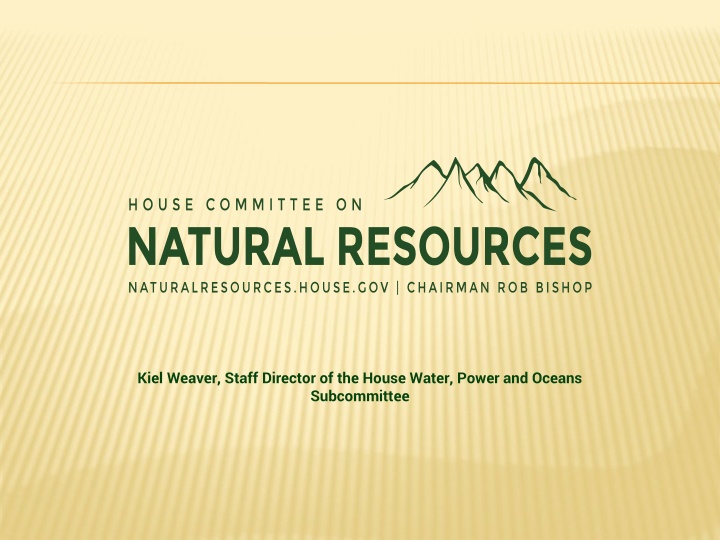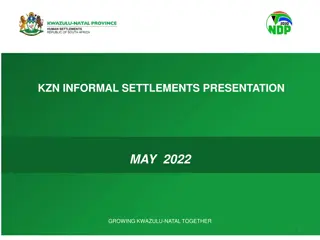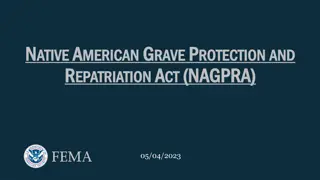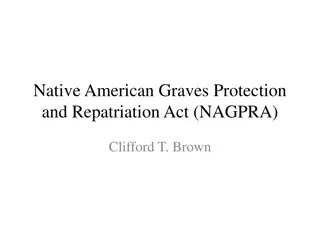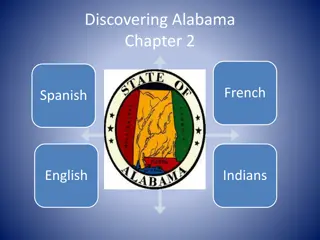Native American Water Rights Settlements in the House: History and Future Outlook
The House committees and subcommittees are involved in Native American water rights settlements, with 29 settlements enacted since 1978. The Claims Resolution Act of 2010 was the latest federally funded bill. Amid spending concerns, Republicans took over the House in 2010, affecting the legislative landscape. The House's approach to settlements in the 114th Congress and the varying nature of these agreements are key areas of focus.
Download Presentation

Please find below an Image/Link to download the presentation.
The content on the website is provided AS IS for your information and personal use only. It may not be sold, licensed, or shared on other websites without obtaining consent from the author.If you encounter any issues during the download, it is possible that the publisher has removed the file from their server.
You are allowed to download the files provided on this website for personal or commercial use, subject to the condition that they are used lawfully. All files are the property of their respective owners.
The content on the website is provided AS IS for your information and personal use only. It may not be sold, licensed, or shared on other websites without obtaining consent from the author.
E N D
Presentation Transcript
Kiel Weaver, Staff Director of the House Water, Power and Oceans Subcommittee
The House Committee on Natural The House Committee on Natural Resources Resources - - 25 Republicans; 17 Democrats 25 Republicans; 17 Democrats - - Out of 25 Republicans, 13 are from West of the Mississippi. Out of 25 Republicans, 13 are from West of the Mississippi.
The House Water, Power and The House Water, Power and Oceans Subcommittee Oceans Subcommittee - - 12 Republicans, 11 Democrats 12 Republicans, 11 Democrats - - Out of 12 Republicans, 7 Westerners Out of 12 Republicans, 7 Westerners - - Jurisdiction includes the Bureau of Reclamation, the Power Jurisdiction includes the Bureau of Reclamation, the Power Marketing Administrations, U.S. Fish and Wildlife Marketing Administrations, U.S. Fish and Wildlife Service, U.S. Geological Survey and the National Service, U.S. Geological Survey and the National Oceanic and Atmospheric Administration Oceanic and Atmospheric Administration - - Oversight and Legislative Responsibilities on Native American Oversight and Legislative Responsibilities on Native American Water Rights Claims Water Rights Claims
MAIN POINTS 1) Committee/Subcommittee Involvement on Water Rights Settlements 2) Recent History (2010-2014) of Water Rights Settlements before the Congress 3) How the House will proceed in the 114th Congress on Water Rights Settlements
ENACTED WATER RIGHTS SETTLEMENTS Since 1978, 29 Native American Water Rights Settlements have been enacted by Congress. Each of these settlements has been different in terms of water quantifications and funding. According to the Congressional Research Service, there are currently 19 negotiating teams for additional settlements.
CLAIMS RESOLUTION ACT OF 2010 The last federally funded Native American Water Rights Settlement bill to be signed into law was the Claims Resolution Act of 2010 . Included Cobell settlement and four water rights settlements (White Mountain Apache, Taos Pueblo, Aamodt and Crow) Passed the House 256-152 before being sent to the President.
2010-2014 There were numerous spending concerns with the Claims Resolution Act of 2010, resulting (in part) the final House vote. Republicans took over the House in the 2010 election.
2010-2014 CONTD Since the 2010 elections, there has been a 48% Member turnover in the House. Staff turnover remains high Most Senate staffers have worked in the Capitol for less than three years. In House offices, one-third of staffers are in their first year, while only 1 in 3 has worked there for five years or more. Among the aides who work on powerful committees where the nation s legislation takes shape, resumes are a little longer: Half have four years of experience. (Washington Times, June 6, 2012) Fiscal Environment has changed. Two settlement acts were signed into law last Congress: the Pyramid Lake Paiute Tribe-Fish Springs Ranch Settlement Act and the Bill Williams River Water Rights Settlement Act of 2014. Both of which did not have any federal funding.
THIS CONGRESS Existing settlements represent a growing part of Bureau of Reclamation s budget request. Three pending bills so far. Nineteen Negotiating Teams on potential settlements. Native American Water Rights can actually benefit the American taxpayer by settling claims against the federal government. Settlements of water rights claims are generally preferable to protracted litigation.
THIS CONGRESS CONTD Bishop Letter to DOJ/DOI A path forward Governs the process to consider Water Settlements in the House during this Congress. Primarily deals with fiscal aspect of the proposed settlements. Resembles the process for creating new Army Corps of Engineers projects under the WRRDA (P.L. 113- 121). Requires DOI/DOJ to answer questions and submit relevant information to Congress.
THIS CONGRESS CONTD Letter asks DOI/DOJ seven things: 1) Provide a statement affirming that each proposed settlement adheres to the current criteria and procedures 2) That each proposed settlement represents a net benefit to the American taxpayer as compared to the consequences and costs of not settling litigation, and specifically support the federal financial authorization
THIS CONGRESS CONTD 3) The Attorney General must have conveyed to a court and all settling parties have agreed to, in writing, a legislative resolution 4) The legislative resolution must be in proposed text. 5) The DOJ is requested to testify before the Natural Resources Committee 6 and 7) The list of legal claims being settled must be listed and any fiscal authorizations for already settled claims or claims that have no legal basis shall not be considered.
THIS CONGRESS CONTD If these seven items are provided/adhered to, then Chairman Bishop intends to introduce the settlement bill at the Administration s request and consider such legislation. QUESTIONS/DISCUSSION
